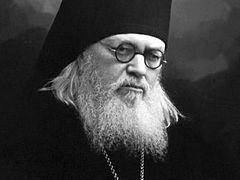We continue our contemplation of the prayer of St. Ephraim the Syrian, now with a series of homilies by Russia’s well-known elder, Archimandrite Kirill (Pavlov), who departed to the Lord last year.
In the name of the Father, the Son, and the Holy Spirit!
Dear brothers and sisters, throughout Great Lent we hear at every Divine Lenten service how the priest reads a short but heartwarming prayer:
O Lord and Master of my life, the spirit of idleness, despondency, ambition, and idle talk give me not.
But rather a spirit of chastity, humble-mindedness, patience and love bestow upon me Thy servant.
Yeah, O Lord King, grant me to see my failings and not condemn by brother, for blessed art Thou unto the ages of ages. Amen.
This prayer consists of only ten requests, but with its penitential spirit and ability to lead a person to heartfelt contrition it surpasses many other prayers, and that is why it is read during Great Lent, when the Church calls all to a renewal of soul, to the ascetic labor of self-proving, to increased prayer and repentance, to the cleansing away of our sins. Every word of it finds a response in our souls, and helps us in our prayer to God for help in the struggle with the passions. The compiler of this prayer, St. Ephraim the Syrian, wept all his life, and therefore his prayer is filled with such deep penitential, edifying feeling and consolation.
St. Ephraim begins his prayer by turning to God: O Lord and Master of my life… God’s Word reveals to us that our lives are connected with God, depend upon Him and are upheld by him. In His merciful hands are the fates of both the righteous and the unrighteous, the good and the evil, the entire animal and plant world. No one and nothing can exist a day or an hour without the life-giving power of the Holy Spirit, which supports the existence of every living creature. Therefore, if we feel God in our hearts, we cannot begin, continue or complete anything on earth without prayer to Him, without His blessing. God is truly the Lord, Head, and Master of our lives.
In the first request, St. Ephraim asks God not to give him the spirit of idleness. We all know what idleness is—laziness and neglect of our most important activity, first and foremost that of our salvation. It can lead a person to inactivity, to complete stagnation in both spiritual life and in our necessary daily work.
Outward idleness is understood by almost everyone, because each of us to one degree or another can be partakers of this spiritual illness when we are given over to carelessness and laziness and allow neglect in our prayers at home, go rarely to church, or allow ourselves to be rushed in our prayers, so that we can get it over with as quickly as possible and have a rest or start gabbing idly. But when this infirmity strikes all the powers of our soul, then a serious moral and emotional state comes on us. Then we no longer live a normal, real life, because we no longer have a constant, life-creating source of meaningful human life in our souls, but rather live a phantom, contrived, useless life of no benefit to anyone. Such a person loves to fall into useless dreams and vain conversations, incapable of performing any good work.
This idleness, this relaxation and carelessness leads us away from the most important concern in our life—salvation of the soul. Therefore we pray that the Lord would deliver us from this infirmity.
In the second request St. Ephraim ask the Lord to deliver him from the infirmity of despondency. Despondency is such a dark, melancholic state of the soul, when all of life appears to the person only from its dark side. Nothing gives him joy, nothing satisfies him, all circumstances seem unbearable to him, he complains about everything, is irritated for the slightest reason—in a word, life itself seems to be nothing but a burden. Despondency, as the holy fathers teach, comes from that same idleness, from lack of faith, unbelief, from not repenting of our sins. To despondency can also lead prior anger or hurting someone else, the absence of the fear of God, talking too much, or misfortune in personal life, work, or other such difficulties.
Despondency also often leads to another more dangerous state of the soul called despair, when a person may allow the thought of untimely death and even consider death an essential blessing in his earthly life’s path.
Submitting to despondency means ceasing our connection with the world around us and not having communication with the Source of our lives—God. “I don’t want to live, I’ve lost all interest in life, and there’s no meaning in it”—these are the kinds of words you’ll hear from a person gripped by despair. Because this infirmity is very serious, the saint asks the Lord to free him from it. This vice is such that we have to pray against it with very persistent, unceasing prayer. The Savior Himself in the Gospel teaches us that we should never despair, but should always pray (cf. Lk. 18:1).
Persistent, ceaseless prayer united with faith in the power of prayer and God’s help will restore our connection with the world around us and save us from despondency. We also have to unite our prayer with the work of cleansing our conscience in the Sacrament of confession, and thus more often will God’s grace be given to us, and strengthen our spiritual forces. Read spiritual books and live according to God’s commandments—all of this is the best way to ward off the spirit of destructive despondency.
In the third request St. Ephraim asks the Lord to deliver him from the spirit of ambition (lust for power). The passion of lust for power is inherent to our sinful, proud nature, and it manifests itself in all areas of human life. For example, in the relationship of a father to his family, a boss to his underlings, a teacher to his students, the senior to the junior—each desires to subject the others to his influence, dictate his will to them. This state of the soul is contrary to the Gospel teaching of Christ, Who Himself showed an example of profound humility and often said that whoever wishes to be greater, let him be the servant of all (cf. Matt. 20:26-27; Mk. 10:43-44; Lk. 22:26).
This vice is bound up with hidden, secret pride, and therefore when we have the passion to teach others, to instruct or rebuke, this is a sure sign that our souls are possessed with the spirit of ambition, lust for power. This spirit makes a person repugnant to everyone around him, and moreover incapable of warring with his own passions and vices. Therefore we pray to the Lord that He would deliver us from it and not allow it to take over our souls.
In his fourth request St. Ephraim asks the Lord to deliver him from the spirit of idle talk, of which practically all people are guilty. Each of us loves to talk vainly; meanwhile the gift of the word is given to us so that we can glorify God, and through words have communication with each other, serving for our mutual edification. There is a wise folk saying that asserts that words are silver, but silence is golden. Many saints have held to this maxim, closing their lips, although they should have opened them for edifying conversation.
A person empties his soul through much talking, weakens it and makes it scattered. Let’s look at the Savior, at how He was brief in His teachings and instructions! The Lord’s Prayer is given in no more than seven requests, and the beatitudes in only nine verses. The angels glorify God in just a few words: “Holy, holy, holy Lord of Sabaoth!”
As a vessel that is often open does not preserve the strength and aroma of its fragrant contents, so also a soul that likes to talk much does not preserve for very long its good thoughts and feelings, but belches forth a flood of condemnation, malice, slander, flattery, and so on. Therefore during the Fast the Church prays:
Set, O Lord, a watch before my mouth, and a door of enclosure round about my lips.
Incline not my heart unto words of evil, to make excuse with excuses in sins (Ps. 140:3–4).
Like weeds that clutter the soil and hinder good grains from growing in it, so do empty, rotten words kill the soul and not allow good thoughts and feelings to grow therein.
Thus dear brothers and sisters, by remembering and preserving the good lessons hidden in the prayer of St. Ephraim the Syrian and following them, we will unfailingly attract God’s grace and become dear to our Heavenly Father; we will become worthy to behold the Heavenly Jerusalem and live in blessedness with all the Heavenly Hosts and the souls of the righteous.
Therefore always, and especially during the days of Great Lent, let us call out:
O Lord and Master of my life, the spirit of idleness, despondency, ambition, and idle talk give me not.
But rather a spirit of chastity, humble-mindedness, patience and love bestow upon me Thy servant.
Yeah, O Lord King, grant me to see me failings and not condemn by brother, for blessed art Thou unto the ages of ages.
Amen.
1962




